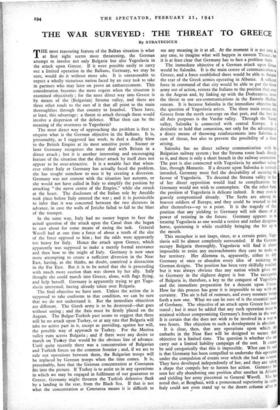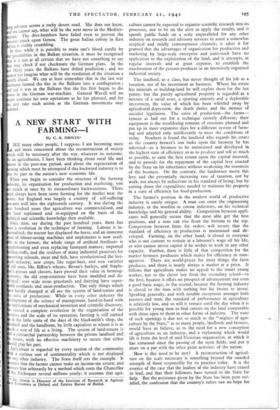THE WAR SURVEYED: THE THREAT TO GREECE
By STRATEGICUS
THE most reassuring feature of the Balkan situation is what at first sight seems most threatening, the German attempt to involve not only Bulgaria but also Yugoslavia in the attack upon Greece. If it were possible easily to carry out a limited operation in the Balkans, Germany, we may be sure, would do it without more ado. It is unreasonable to expect a wholly victorious nation faced by an easy task to take in partners who may later on prove an embarrassment. This consideration becomes the more cogent when the situation is examined objectively ; for the most direct way into Greece is by means of the (Bulgarian) Struma valley, and there are three other roads to the east of it that all point to the main thoroughfare through that country to Istanbul. These have, at least, this advantage: a threat to attack through them would involve a dispersion of the defence. What then can be the meaning of the overtures to Yugoslavia?
The most direct way of approaching the problem is first to enquire what is the German objective in the Balkans. It is, presumably, as I suggested last week, to deal a deadly blow to the British Empire at its most sensitive point. Sooner or later Germany recognises she must deal with Britain in a direct attack ; but it is another interesting and encouraging feature of the situation that the direct attack by itself does not appear to be over-attractive. It is a notable fact that when- ever either Italy or Germany has actually faced the problem, she has sought somehow to ease it by creating a diversion. Germany was not content with the situation last autumn, or she would not have called in Italy to simplify the position by attacking " the nerve centre of the Empire," while she struck at the heart. The disclosure of the Italian role by Ansaldo took place before Italy entered the war ; and it is permissible to infer that it was concerted between the two dictators in advance, in case the walls of Jericho failed to fall to the blast of the trumpet.
In the same way, Italy had no sooner begun to face the actual question of the attack upon the Canal than she began to cast about for some means of easing the task. General Wavell had at one time a force of about a tenth of the size of the force opposed to him ; but the odds were apparently too heavy for Italy. Hence the attack upon Greece, which apparently was supposed to make a merely formal resistance and then bow to the might of Italy. Germany is now once more attempting to create a sufficient diversion in the Near East, having, as she thinks, no doubt, contrived a distraction in the Far East. But it is to be noted that she is proceeding with much more caution than was shown by her ally. Italy thought she could march into Greece, alone, with flags flying, and help herself. Germany is apparently trying to get Yugo- slavia interested, having already taken over Bulgaria.
The final objective we have seen. Unless the action she is supposed to take conforms to that condition, we can be sure that we do not understand it. But the immediate objectives are different. The Greek army is to be destroyed—that goes without saying ; and the Axis must be firmly placed on the Aegean. The Bulgar-Turkish pact seems to suggest that there will be no attack upon Turkey, or at any rate that Bulgaria will take no active part in it, except as providing, against her will, the possible way of approach to Turkey. For the Maritsa valley runs across Bulgaria ; and if there were any desire to march on Turkey that would be the obvious line of advance. Until quite recently there was a concentration of Bulgarian and Turkish forces on the common frontier ; and, if we are to rule out operations between them, the Bulgarian troops will be replaced by German troops when the time comes. It is, presumably, here that the German concentration at Constanza fits into the picture. If Turkey is to assist us in any operations in which we may be engaged in fulfilment of our guarantee to Greece, Germany might threaten the Turkish defensive flank by a landing in the rear, from the Black Sea. If that is not what the concentration at Constanza means it is difficult to see any meaning in it at all. At the moment it is not easy, it any case, to imagine what will happen in eastern Thrace ; it is at least clear that Germany has to face a problem there.
The immediate objective of a German attack upon Grease would be Salonika. It is the main centre of communications Greece, and a force established there would be able to threat the rear of the Greek armies operating in Albania. A suffiejelt force in command of that city would be able to put the Greg army out of action, restore the Italians to the position they cove in the Aegean and, by linking up with the Dodecanese, revive the threat to our sea-communications in the Eastern Medita.
ranean. It is because Salonika is the immediate objective that the question of Yugoslavia arises. The three main routes into Greece from the north converge on that port, and the best fa all Axis purposes is the Vardar valley. Through the Vardar valley, Salonika- is connected with central Europe. It is desirable to hold that connexion, not only for the advantage vi a direct means of throwing reinforcements into Salonika, i case of threat, but also to prevent the possibility of a threat arising.
Salonika has no direct railway communication with tfe Bulgarian railway system ; but the Struma route leads directly to it, and there is only a short breach in the railway connexions The port is also connected with Yugoslavia by another railway line, through Monastir. If a descent upon Salonika is seriously intended, Germany must feel the desirability of securing the favour of Yugoslavia. To descend the Struma valley in face of her direct opposition would lead to complications that Germany would not wish to contemplate. On the other hand, the position of Yugoslavia is delicate indeed. It may even be gravely compromised already. The Serbs are among the bravest soldiers of Europe, and they could be trusted to lock after themselves—up to a point. It is the tragedy of their position that any yielding to Germany will rob them of all power of resisting in the future. Germany appears to be treating Yugoslavia as one would a restive and rather dangerous horse, quietening it while stealthily bringing the bit up to the mouth.
This metaphor is not inapt, since, at a certain point, Yugo- slavia will be almost completely surrounded. If the Germans occupy Bulgaria thoroughly, Yugoslavia will find it almost impossible to resist any encroachments they care to make on her territory. Her dilemma is, apparently, either to defy Germany at once or abandon every idea of resisting the German designs. The position has been very skilfully reached; but it was always obvious that any nation which gives way to Germany in the slightest degree is lost. The occupation of Bulgaria is, therefore, a key to the conquest of Yugoslavia, and the immediate preparation for a descent upon Great How far this process has gone it is impossible to say with any certainty. The air is full of rumours, and every moment brings forth a new one. What we can be sure of is the essential needs of Ger&any. The objective of an attack upon Greece has been stated ; but it must be added that any such operation must he attained without compromising Germany's freedom in the west It is certain that she does not wish to be involved in a war on two fronts. Her objection to such a development is absolute It is dear, then, that any operations upon which she embarks in the Near East will be designed to secure their objective in a limited time. The question is whether she can carry out a limited liability campaign of the sort. It cannot be said categorically that this is impossible. What can be said is that Germany has been compelled to undertake this operatic under the compulsion of events over which she had no control They have developed independently of her, and they are takig a shape that compels her to hasten her action. Germany has seen her ally abandoning one position after another in Albania, and yielding her army piecemeal to General Wavell. _ She has noted that, at Benghazi, with a pronounced superiority in tanks? Italy could not even stand up to the desert column after its fig advance across a rocky desert road. She does not know, d we cannot say, what will be the next move in the Mediter- nean. The dive-bombers have failed even to prevent the assive attack upon Genoa. The great Italian colony in East Erica is visibly crumbling. In fine, while it is possible to make one's blood curdle by e possibilities in the Balkan situation, it must be recognised at it is not at all certain that we have not something to say t may check if not checkmate the German plans. In the st thirty years the Balkans have defied prediction ; and we not yet imagine what will be the resolution of the situation a onth ahead. We can at least remember that in the last war rmany fanned the fire in the Balkans into a conflagration ; d yet it was in the Balkans that the fire first began to die own in the German war-machine. General Wavell will no oubt continue his own operations as he has planned, and for e rest take such action as the German movements may emand.































 Previous page
Previous page